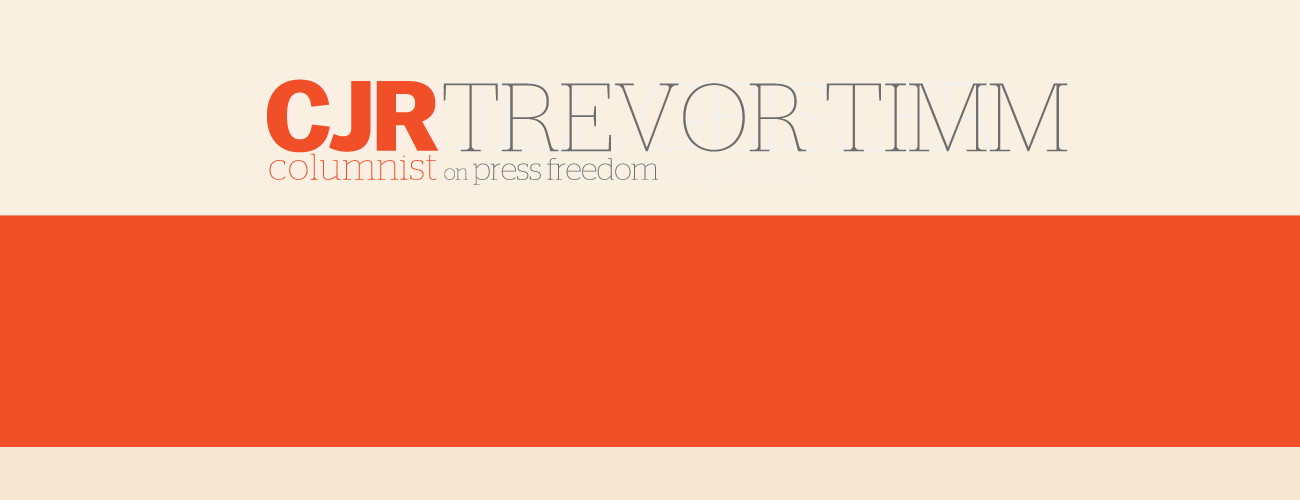Sign up for the daily CJR newsletter.
Donald Trump turned his Twitter ire on NBC and the NFL this past week. But beyond just criticizing them, Trump is threatening to punish the network and the league with the government’s regulatory might.
Trump tweeted on Wednesday that NBC’s broadcasting license “must be challenged” and potentially “revoked,” based on a series of NBC news stories that embarrassed him. He also suggested the NFL’s tax status should be changed if the NFL continues to allow its players to peacefully protest police brutality by kneeling during the National Anthem.
ICYMI: The one “media world mystery” that remains unsolved around Weinstein scandal
Many have commented on the First Amendment implications if Trump were to actually go after NBC’s license (or really, the licenses of local affiliates since NBC itself doesn’t need a license) or the NFL’s tax status. But Trump need not act on his threats for his actions to be considered a First Amendment violation. There’s a compelling argument Trump is in violation of Constitution right now—after he crossed the line from criticism of protected speech to openly threatening government action.
There’s plenty of case law on this subject from the Supreme Court to appeals courts around the country. Most recently, in a case in the Seventh Circuit called BackPage LLC vs. Thomas Dart, Sheriff of Cook County, Illinois, just-retired Judge Richard Posner articulated exactly why Trump may already be running afoul of the First Amendment merely through his threats.
ICYMI: He was excited to profile a controversial athlete. What happens next? Every journalist’s nightmare.
In Backpage, Dart embarked on a one-man campaign to get Visa and Mastercard to cut off credit card donations to Backpage.com because of its adult section. Instead of prosecuting Backpage for any specific violation, he sent letters pressuring the credit card companies to cut off any payments to Backpage.com for any reason, since some of the Backpage ads, as Posner wrote, “might be for illegal sex-related products or services.”
Posner, citing several decades of case law, made it clear that if the Sheriff can’t sue or prosecute Backpage for legitimate violations of the law, he can’t then turn around and use his power as a government official to make threatening statements in an attempt to censor them in other ways:
a public official who tries to shut down an avenue of expression of ideas and opinions through “actual or threatened imposition of government power or sanction” is violating the First Amendment. American Family Association, Inc. v. City & County of San Francisco, 277 F.3d 1114, 1125 (9th Cir. 2002).
When Trump veers into actual threats of government action for speech he doesn’t like, he is arguably crossing that same line that the Seventh Circuit, and the Supreme Court before it, has condemned.
As Vice President Mike Pence has already articulated, Trump does have his own First Amendment right to opine about things he likes and doesn’t like—even in his caustic, insulting style. But as Posner made clear, as a government official, those rights are limited:
A government entity, including therefore the Cook County Sheriff’s Office, is entitled to say what it wants to say—but only within limits. It is not permitted to employ threats to squelch the free speech of private citizens. “[A] government’s ability to express itself is [not] without restriction. … [T]he Free Speech Clause itself may constrain the government’s speech.” Walker v. Texas Division, Sons of Confederate Veterans, Inc., supra, 135 S. Ct. at 2246; see also Rosenberger v. Rector & Visitors of the University of Virginia, supra, 515 U.S. at 833–34.
Trump is threatening NBC or the NFL not as a private citizen, but as the President of the United States, from his Twitter account, which the White House has previously acknowledged is a vessel for releasing “official statements.”
Even if Trump does not have the sole power to carry out the proposed punishment of revoking licenses or changing tax statuses himself, a case may still be actionable. As the Second Circuit Court of Appeals noted in 2003:
“[T]he fact that a public-official defendant lacks direct regulatory or decisionmaking authority over a plaintiff, or a third party that is publishing or otherwise disseminating the plaintiff’s message, is not necessarily dispositive … . What matters is the distinction between attempts to convince and attempts to coerce.”
Now, everyone knows Trump regularly issues legal threats that he never follows through on. But that may not matter either: Even if Trump’s comments on punishing NBC and the NFL are seen as empty threats, it’s still a First Amendment issue. As Posner wrote in the Seventh Circuit’s Backpage decision: “[S]uch a threat is actionable and thus can be enjoined even if it turns out to be empty—the victim ignores it, and the threatener folds his tent.”
Sadly, it looks as if the NFL may already capitulate to Trump after his barrage of tweets and comments from the last couple weeks, with owners and the league saying they’re considering a rule forcing players to stand.
But it would be quite interesting if the NFL Players Union or individual players decided to sue Trump for violating their First Amendment rights, or if NBC took a stand and demand a court issue an injunction to prevent Trump for taking any action on the basis of his anger over unflattering news stories.
ICYMI: ESPN suspended Jemele Hill. We now know the network’s 1st and foremost goal
Has America ever needed a media defender more than now? Help us by joining CJR today.







